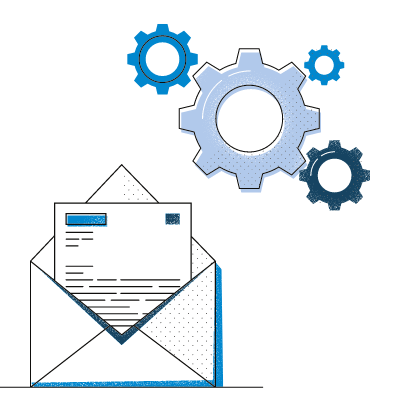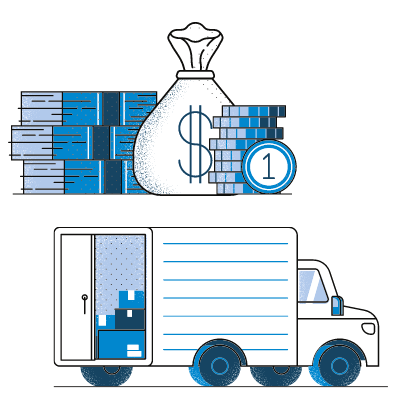The fast-paced world sets its rules for how you should run the business. Higher customer expectations, stronger competition, evolving technology… All these things leave a significant footprint and require more effort from your side to stay afloat. And when you hold ambitious goals to win the market, it means even more work.
A few decades ago, that would mean working harder. Day and night. But not now. We are lucky to have an opportunity to transform the working environment by automating workflows and letting smart software deal with repetitive day-to-day tasks.
Contents:
- Benefits of Automating the Business Operations
- Types of Business Automation Software
- Business Information System (BIS) and Information Management System (IMS)
- Enterprise-Wide Business Management Systems: Customer Relationship Management (CRM), Enterprise Resource Planning (ERP), Supply Chain Management (SCM)
- A Quick Overview of CRM, ERP, and SCM

The Nitty-Gritty of the Business Automation Software
Business workflow automation is the process of replacing manual processes with an algorithm- or AI-driven technology. In other words, the company entrusts the processes that were once handled by employees to smart apps that take care of them within the scope of programmable rules.
Organizations of all sizes, big or small, win from implementing business automation software in many ways. Here are just a few benefits of automating the business operations:
- Enhanced productivity – when employees are free from monotonous day-to-day tasks, they can finally focus on more value-added activities without wasting time on less critical processes;
- Improved accuracy – apps are programmable, and they strictly follow the rules eliminating any human-related errors;
- Better customer service – business automation tools help companies drive and nurture new leads, build strong omnichannel relationships with customers, respond to their requests easier and faster, and track the success of every effort aimed at improving customer service;
- Reduced operation costs – automation of workflows allows companies to cut the use of resources;
- Complete visibility & transparency – you’ll always know what’s going on in your business by checking the informative dashboards with the critical metrics;
- Enhanced data management – manage data easier without duplication or data inaccuracy by keeping the files centralized.

However, you might face some roadblocks when implementing the shift to automated business workflows. For example, if you do not have an internal IT team, you may need to outsource the services from vendors. Although there are thousands of off-the-rack software, you may find that none of them meet the needs of your organization.
With Advantiss, you’ll easily overcome these minor issues. Whether you want an experienced IT team to digitally transform your company’s environment or develop a custom app that would 100% be able to tackle business challenges, we are within your reach.

Types of Business Automation Software
Business Information System (BIS) and Information Management System (IMS)
Modern businesses are driven by information. No wonder there is a saying that data is the new gold of the 21st century.
So, along with workflow automation, there is a strong demand for business information management and IMS tools.
A business information system (BIS) harnesses technology to help companies improve their operation through assessing data, making accurate factual predictions, and granting information to the right people at the right time.
An information management system (IMS), also known as management information systems (MIS), stands for the app that facilitates database management, storage, and retrieval.
All in all, they target information management and technology, allowing companies to unlock the hidden power of data and leverage it for the sake of business development.

Enterprise-Wide Business Management Systems: CRM, ERP, SCM
Unlike business information management systems that mainly help manage data, business management tools cover other facets of a business. Their objective is to streamline core business processes that directly affect the organization’s profitability.
Customer Relationship Management System (CRM)
CRM customer relationship management software puts driving, nurturing, and retaining customers at the core. It helps effectively manage the company’s interaction with every lead throughout the entire customer journey.
There are three main types of CRM customer relationship management tools, which serve different missions:
- Operational – streamlines the company’s workflows related to communication with customers.
- Analytical – collects and analyses data about the level of customer engagement, service satisfaction, and the prospects’ behavior so that the company could make more informed decisions.
- Collaborative – enables sales, marketing, support, and other departments to cooperate in a centralized hub to deliver a better customer experience.
There are numerous customer relationship management system options packed with different features. Some apps might include sales, marketing, or help desk modules, while others might have them all.

Enterprise Resource Planning (ERP)
In contrast to CRM covering the customer-related side of the business, ERP solutions put day-to-day business operations like accounting, project management, risk management, procurement, human resources, and more in the first place.
The greatest advantage of the enterprise resource planning (ERP) app is that it integrates all the instruments the organization may need to run the business from a single dashboard. In fact, you can think of this software as a glue that brings all the core business operations together. In this way, the departments can communicate more easily and solve issues much faster.

Supply Chain Management (SCM)
If your business is related to goods manufacturing or retail, you will want to use an SCM supply chain management tool. It helps coordinate the whole production flow of goods or services from one place. It covers everything – from product development and raw materials sourcing to controlling the demand and delivering the goods.
As a result, the companies using supply chain management software maximize customer value by delivering quality products that live up to the buyers’ expectations and cut excess costs associated with poor resource management.

A Quick Overview of CRM, ERP, and SCM
The above-mentioned business management apps might look enticing, and you may want to deploy all of them, which is absolutely fine as it will definitely give a significant boost to your business. However, let us sum everything up for you so you have a better idea of the most common solutions.
| CRM | ERP | SCM | |
| Mission | Control every aspect of the relationship between the business and every particular lead. | Streamline core business operations and enhance communication between the departments. | Manage the whole product development cycle and goods flow. |
| Specific features |
|
|
|
| Who is it for | B2B or B2C businesses interacting with customers | Almost any business | Manufacturers, retailers, stakeholders in the supply chain, vendors |
| Automate workflows and sales force for enhanced productivity and better performance | |||
The great news is that if your organization already uses one of these tools, you can integrate a new app for smooth data migration or management. Besides, in case you would like to switch from a legacy app to a more advanced or custom solution, that won’t be a big deal as well. At least, if you entrust this to Advantiss. As a team of qualified and experienced developers, we have a vast track record in syncing and developing custom CRM, ERP, or SCM solutions for businesses in various industries.
The Final Word
Business automation is indispensable for companies of all sizes. That’s the only way to run the business efficiently by directing the company’s resources to the more value-added areas while letting the apps do the tedious job. In the highly competitive world where customers do not tolerate poor service, you do not have another choice but to get assistance from cutting-edge technology.


